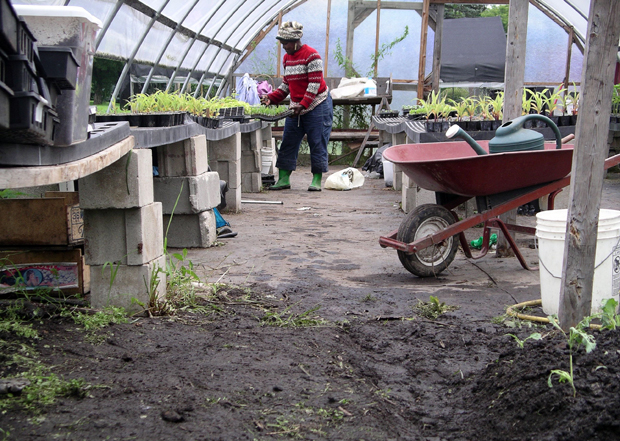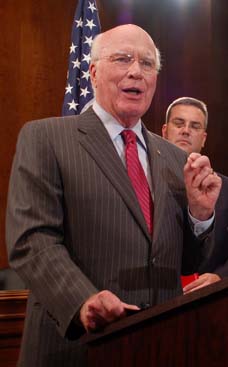
The New Entry Sustainable Farming Project is luring dozens of urban immigrants into growing organic crops for the market and for their own tables. Almost all the farmers are poor and arrive with a range of agricultural skills. The New Entry Project gives them a three-year running start, with land to cultivate, subsidized use of equipment and free training. McKenzie Boekhoelder is the project's on-site agriculture expert. A former Peace Corps volunteer in Zambia, Boekhoelder says that, when it comes to food, immigrants face a whole new world in America. "The folks who are coming to us from southeast Asia and different parts of Africa were used to having food come from 15 kilometers from where they were living, " she says. "The huge contrast in coming to America and not knowing where your food comes from is a pretty big thing."
Zambia RPCV McKenzie Boekhoelder is the on-site agriculture expert for the New Entry Sustainable Farming Project
For Immigrants In Lowell, The Tools To Grow Familiar Foods
By CHRIS BURRELL (HERE & NOW)
Published August 24, 2009
UPDATED 5:53 PM
Caption: Justina, from Cameroon, tends to young plants at a New Entry farm site. (Chris Burrell/WBUR)
LOWELL, Mass. - Under the heat of a mid-afternoon sun, Seaona Ban Ngufor swings a hoe at the knots of crabgrass that threaten her furrows of peppers and pumpkins. "I weeded just a week ago," she says, "but look at it now, you have to weed it back. The hardest thing is weeding."
The 53-year-old from Cameroon won't complain that she just worked an eight-hour shift as a nursing assistant in a home for elderly. But as tired as she is, the payoff is vital - it fills her family's plates.
"I live with my brother, with my nieces, so all of us eat these vegetables," she says. "So that's why I feel happy. When I bring the vegetables, a lot we cook, everybody will be satisfied. Because if we go to buy, we not have that much, but if it's from the farm, at least we get enough."
The historical hotbed of America's Industrial Revolution, Lowell, Mass., seems an unlikely place to launch a social experiment in agriculture, but today the city is teeming with recent immigrants from Africa, Latin America and South Asia, who hunger not only for a leg up economically, but also for a taste of food from their homeland.
The New Entry Sustainable Farming Project is luring dozens of urban immigrants into growing organic crops for the market and for their own tables. Almost all the farmers are poor and arrive with a range of agricultural skills. The New Entry Project gives them a three-year running start, with land to cultivate, subsidized use of equipment and free training.
McKenzie Boekhoelder is the project's on-site agriculture expert. A former Peace Corps volunteer in Zambia, Boekhoelder says that, when it comes to food, immigrants face a whole new world in America.
"The folks who are coming to us from southeast Asia and different parts of Africa were used to having food come from 15 kilometers from where they were living, " she says. "The huge contrast in coming to America and not knowing where your food comes from is a pretty big thing."
Braids dangle over Nikki Makarutsa's forehead as her right hand sweeps low over leafy pumpkin greens. You won't find pumpkin greens at the local supermarket, but Zimbabweans like Nikki yearn for this vegetable.
"It's a delicious food in my country, it's a delicacy," she says. "That's high in iron."
(Chris Burrell/WBUR)
Sinikiwe (Nikki) Makarutsa shows her prized pumpkin greens. (Chris Burrell/WBUR)
Nutrition ranks high on Nikki's list of reasons for becoming a farmer. A middle-school teacher in Zimbabwe before she fled the political turmoil nine years ago, Nikki now works the night shift as a practical nurse and tends to her four acres in her off-hours.
In black rubber boots decorated with white peace signs, she strides from furrows to the outdoor wash basin with a certain gusto. "I work 11 to 7, I go home, take breakfast, come home, take a shower, sleep, go to work - that's the life, 24/7," she says. "Doing everything manual, you really need to be at a farm like more than your own job."
But farming may soon supplant Nikki's nursing job. She was just given three additional acres of land from a nearby church. In exchange, she'll give 8 percent of her crops to homeless shelters. Her goal is to run her own community-supported farm.
"That's my big dream and I'm not going back about it," she says, laughing. "If it means me delivering door to door, if it means I'll make an arrangement where the customers can come and pick it up - I really want to do it."
She's already given her farm a name, one with roots in her homeland: Pamzinda, a name she says means being at home. "Quiet, fresh air, plants growing green and so forth," she explains. "So you can go harvest yourself and they don't have to come from Pennsylvania or Indiana or go through a lot of truck stops. Right here, can harvest them - that's the feeling that I want."
Seaona Ban Ngufor knows that desire for home away from home. To till the soil and scrape away weeds, she uses a special tool she brought all the way from her native Cameroon. "When I was coming from home, I put it in my bag with my clothes," she says, "I didn't buy it, I brought it right away from Africa."
On a recent Saturday at a roadside farmer's market, Seaona makes a memory come alive for a customer named Naynay, an immigrant from Sierra Leone. It happens with a vegetable most Africans know well, a leafy green called amaranth.
"I'm going to make stew," Naynay says, smiling broadly. "Green stew."
Seaona's greens suddenly shrink the thousands of miles that separate Lowell from Freetown. There are smiles on both sides of this farm stand. Nikki witnesses the same event, the cultural chord that resonates when people from far away see the food she grows right here.
"Kenyans call it sukomawekee. For what reason I don't know, I don't come from Kenya," Nikki says. "When they saw it, they all scream that name, and I'm like, ‘Oh, I have it here.'
"From the first when they come here, they are so surprised, they are so happy. It's never enough, I have to limit them," she says. "To say, ‘No, you have to take like 10 dozens, because we need to give other people.' It's really rewarding, just to bring memories to the people."













